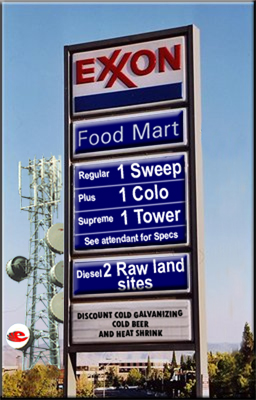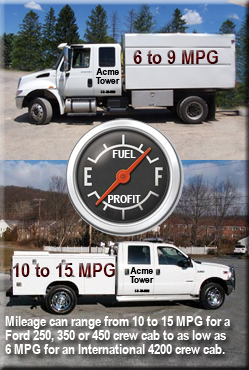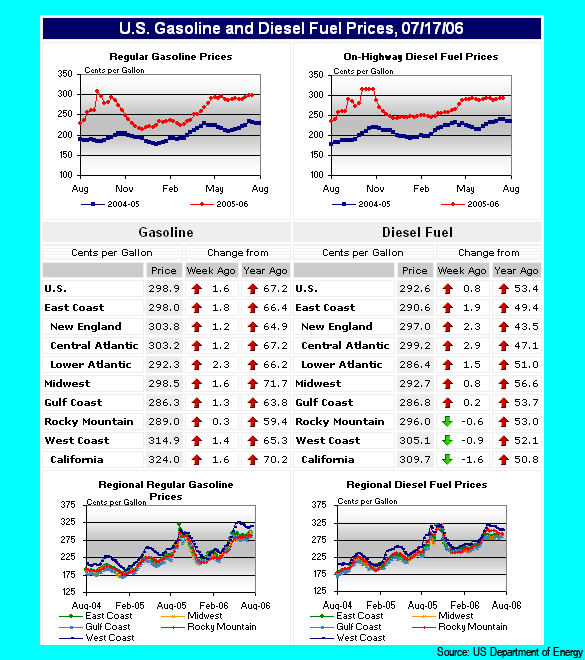|
Some are just biting the petroleum bullet
Tower companies are tackling ways to be compensated for record high fuel costs 
July 21, 2006 - Economists will proudly explain that in real inflation-adjusted dollars, gas and diesel prices are the same or lower today than in most previous decades, but it's not a balm for wireless contracting businesses who must cope with fuel prices that have topped $3.00 per gallon in many areas of the country.
Of thirty six companies that responded to a survey this week by WirelessEstimator.com, the majority replied that they are raising their prices accordingly to accommodate the fuel increases.
That may work for companies in a less-competitive environment or in evaluating pricing for multi-state mobilizations, but some contractors say that highly aggressive bidding for universal mobile telecommunications system work in some markets is not allowing contractors to figure in the increased price of fuel and it requires them to reduce their profit in an already thin margin sector.
Increases must be passed on
"It's obvious the increase has to be passed along. Someone's got to pay it," explained one New England line and antenna contractor. "We pay it and if we can't pass it along then we can't keep going like that."
In California, where environmental fuel requirements and taxes are the highest in the nation, and gas is currently $3.24 for regular, a West Coast rigger said he has initiated a surcharge for his customers, but it is receiving a lukewarm reception from some clients and is being refused by others.
Western US tower companies find higher project fuel costs since they travel more to out of town jobs. East Coast crews tend to be more local and don't feel the increase as much.
Tower leasing personnel, site acquisition agents, mapping engineers and other individuals serving the tower industry are also flinching at the high cost of gas. Many workers receive a per mile reimbursement amount that is infrequently reviewed by many companies to reflect adequate compensation.
A penny at the pump will cost $27.50
Both large and small tower contractors feel the same pump pain. In the past four months gas has risen $.60 per gallon, a 40% increase. With company pickup trucks and crew cab vehicles averaging 33,000 miles per year, according to survey respondents, at approximately 12 miles per gallon, each vehicle will cost the owner $1,650 more in fuel if prices remain the same for the next year.
Larger tower companies with approximately 300 field vehicles can expect a $495,000 added burden. A Northwest erector, with an International 4200 crew cab that averages 40,000 miles and 8 miles per gallon, said he anticipates an increase of $3,000 in additional fuel costs just for the one vehicle. Boom trucks, some of the industry's largest gas guzzlers, are getting 8 miles per gallon as well.
Trucks and fuel economy are not happy partners. When trucks are designed, utility-oriented factors such as payload, towing capacity, and cargo space have greater influence on a designer's direction than does overall efficiency. After all, it's difficult to streamline a Chevrolet 3500 with tower equipment utility boxes.
All survey respondents stated that fuel economy was not their primary consideration when purchasing a new truck. Engine performance, functionality, maintenance and reliability ranked high on their pick list.
The most popular trucks and crew cabs owned by wireless construction companies are the Ford F-250 and F-350 series. One company said that they were replacing many of their Ford trucks with Chevrolet 2500 and 3500 series vehicles. A history of diesel injector problems was cited.
The number of diesel powered trucks edged out gasoline trucks 53 to 47 percent, according to the survey. Diesel engines are quieter and more powerful than ever, while continuing to deliver supreme fuel efficiency -- up to 40 percent better than their gas-powered siblings.
Company managers said that to reduce their fuel costs they are carefully monitoring fuel expense statements to ensure that they are not abused. Another cost saving effort being employed is to use crew cab trucks and less drivers. "Where we used to send two vehicles to a project, we're now sending one," explained a Tampa, Florida project manager.
|
Historical Gas Prices*
|
| Year |
Price Per Gallon |
|
1950
|
$1.91
|
|
1955
|
$1.85
|
|
1960
|
$1.79
|
|
1965
|
$1.68
|
|
1970
|
$1.59
|
|
1975
|
$1.80
|
|
1980
|
$2.59
|
|
1985
|
$1.90
|
|
1990
|
$1.51
|
|
1995
|
$1.28
|
|
2001
|
$1.66
|
|
2002
|
$1.31
|
|
2003
|
$1.52
|
|
2004
|
$1.79
|
*Prices adjusted for inflation
Source: U.S. DOE |
Some company owners said that during the hot summer months it is not uncommon for them to find their vehicles idling unattended for an hour or more to keep the air conditioner running. Excessive highway speed also increases fuel usage - $.20 per gallon for every 10 mph over 60 mph.
You can speed, but you can't hide
One option that Advanced Tower Services, Inc. of Albuquerque, New Mexico is taking advantage of to reduce fuel and vehicle costs is installing global positioning devices in their trucks.
The GPS unit not only monitors the vehicle's speed, it also provides idle time and vehicle diagnostics. Equally as important, it allows company managers to know exactly where their vehicles are at any time of the day.
According to the company's president, Cliff Barbieri, any time a truck experiences a problem, his administrators can see it on line and have the truck sent to the shop for repairs, He's had a few instances where immediate attention fixed fuel, emissions and high temperature problems.
 Most GPS programs can follow the historical track of a particular vehicle; enable a driver to get directions; record speed, miles driven per gallon of gas, real-time mileage and idling time; and detect unauthorized use of a vehicle and if cargo doors are opened or closed. Most GPS programs can follow the historical track of a particular vehicle; enable a driver to get directions; record speed, miles driven per gallon of gas, real-time mileage and idling time; and detect unauthorized use of a vehicle and if cargo doors are opened or closed.
Additionally, the device provides daily odometer updates and alerts when vehicles have reached predetermined maintenance intervals. It also responds when roadside assistance is needed. The cost of these GPS products and installation ranges from $500 to $1,200 per truck, and the monthly service fee is $10 and up, depending on the types and number of reports requested.
Same time next year
Ideally, we would like to revisit gasoline rates a year from now and note a leveling off or reduction from today's prices; however, with the soaring worldwide demand for crude oil, spurred by a booming U.S. and Chinese economy as well as international conflicts, it appears that we have all the ingredients for a perfect storm.
Companies that put in place a fuel conservation plan will have a better chance than their competition of weathering it out.

|